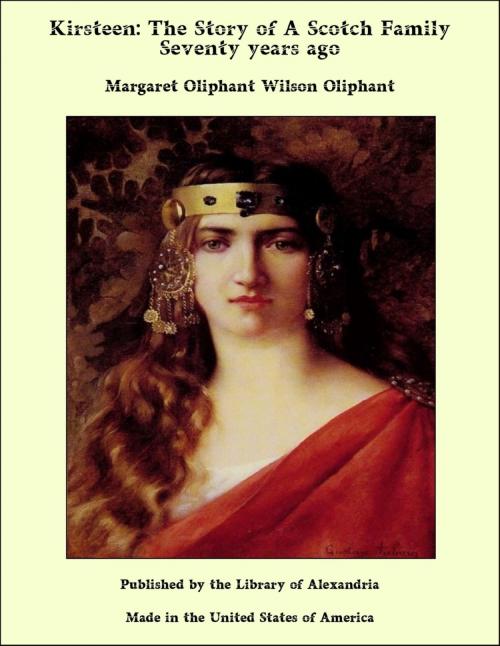Kirsteen: The Story of A Scotch Family Seventy years ago
Nonfiction, Religion & Spirituality, New Age, History, Fiction & Literature| Author: | Margaret Oliphant Wilson Oliphant | ISBN: | 9781465626165 |
| Publisher: | Library of Alexandria | Publication: | March 8, 2015 |
| Imprint: | Language: | English |
| Author: | Margaret Oliphant Wilson Oliphant |
| ISBN: | 9781465626165 |
| Publisher: | Library of Alexandria |
| Publication: | March 8, 2015 |
| Imprint: | |
| Language: | English |
The scene was the parlour at Drumcarro, in the wilds of Argyllshire, the speakers, the mistress of the house de jure, and she who was at the head of affairs de facto, Marg’ret the housekeeper, cook, lady’s maid, and general manager of everything. Mrs. Douglas had brought Marg’ret with her as her maid when she came to Drumcarro as a bride some thirty years before; but as she went on having child after child for nearly twenty years, without much stamina of either mind or body to support that continual strain, Marg’ret had gradually become more and more the deputy and representative, the real substitute of the feminine head of the house. Not much was demanded of that functionary so far as the management of its wider affairs went. Her husband was an arbitrary and high-tempered man, whose will was absolute in the family, who took counsel with no one, and who after the few complaisances of a grim honeymoon let his wife drop into the harmless position of a nonentity, which indeed was that which was best fitted for her. All her active duties one by one had fallen into the hands of Marg’ret, whose first tender impulse to save the mistress whom she loved from toils unfitted for her, had gradually developed into the self-confidence and universal assumption of an able and energetic housekeeper born to organize and administer. Marg’ret did not know what these fine words meant, but she knew “her work,” as she would have said, and by degrees had taken everything in the house and many things outside it into her hands. It was to her that the family went for everything, who was the giver of all indulgences, the only person who dared speak to “the maister,” when clothes were wanted or any new thing. She was an excellent cook, a good manager, combining all the qualities that make a house comfortable, and she was the only one in the house who was not afraid of “the maister,” of whom on the contrary he stood in a little awe. A wife cannot throw up her situation with the certainty of finding another at a moment’s notice as a good housekeeper can do—even if she has spirit enough to entertain such an idea. And poor Mrs. Douglas had no spirit, no health, little brains to begin with and none left now, after thirty years of domestic tyranny and “a bairntime” of fourteen children. What could such a poor soul do but fall into invalidism with so many excellent reasons constantly recurring for adopting the habits of that state and its pathos and helplessness? especially with Marg’ret to fall back upon, who, though she would sometimes speak her mind to her mistress, nursed and tended, watched over and guarded her with the most unfailing care. Drumcarro himself (as he liked to be called) scarcely dared to be very uncivil to his wife in Marg’ret’s presence. He knew better than to quarrel with the woman who kept so much comfort with so little expense in his spare yet crowded house.
The scene was the parlour at Drumcarro, in the wilds of Argyllshire, the speakers, the mistress of the house de jure, and she who was at the head of affairs de facto, Marg’ret the housekeeper, cook, lady’s maid, and general manager of everything. Mrs. Douglas had brought Marg’ret with her as her maid when she came to Drumcarro as a bride some thirty years before; but as she went on having child after child for nearly twenty years, without much stamina of either mind or body to support that continual strain, Marg’ret had gradually become more and more the deputy and representative, the real substitute of the feminine head of the house. Not much was demanded of that functionary so far as the management of its wider affairs went. Her husband was an arbitrary and high-tempered man, whose will was absolute in the family, who took counsel with no one, and who after the few complaisances of a grim honeymoon let his wife drop into the harmless position of a nonentity, which indeed was that which was best fitted for her. All her active duties one by one had fallen into the hands of Marg’ret, whose first tender impulse to save the mistress whom she loved from toils unfitted for her, had gradually developed into the self-confidence and universal assumption of an able and energetic housekeeper born to organize and administer. Marg’ret did not know what these fine words meant, but she knew “her work,” as she would have said, and by degrees had taken everything in the house and many things outside it into her hands. It was to her that the family went for everything, who was the giver of all indulgences, the only person who dared speak to “the maister,” when clothes were wanted or any new thing. She was an excellent cook, a good manager, combining all the qualities that make a house comfortable, and she was the only one in the house who was not afraid of “the maister,” of whom on the contrary he stood in a little awe. A wife cannot throw up her situation with the certainty of finding another at a moment’s notice as a good housekeeper can do—even if she has spirit enough to entertain such an idea. And poor Mrs. Douglas had no spirit, no health, little brains to begin with and none left now, after thirty years of domestic tyranny and “a bairntime” of fourteen children. What could such a poor soul do but fall into invalidism with so many excellent reasons constantly recurring for adopting the habits of that state and its pathos and helplessness? especially with Marg’ret to fall back upon, who, though she would sometimes speak her mind to her mistress, nursed and tended, watched over and guarded her with the most unfailing care. Drumcarro himself (as he liked to be called) scarcely dared to be very uncivil to his wife in Marg’ret’s presence. He knew better than to quarrel with the woman who kept so much comfort with so little expense in his spare yet crowded house.















